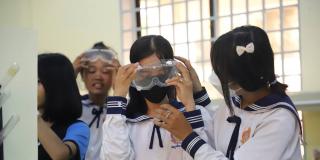
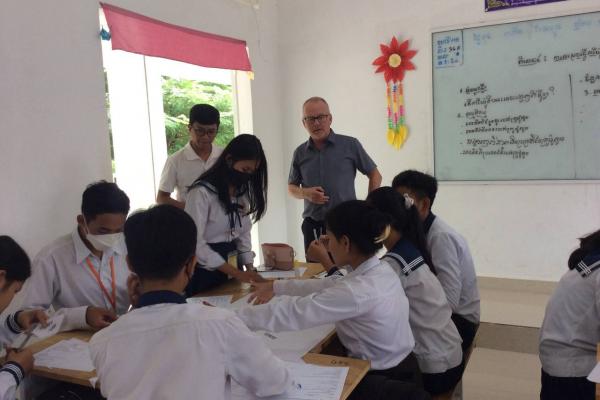
Sean McMorrow is a volunteer regional education advisor on the Professional Development in Upper Secondary Schools (PDUSS) project in Cambodia. After retiring from a successful career as a science teacher, Sean decided to share his skills to help Cambodian children pursue careers in science, technology, engineering, and mathematics (STEM).
My name is Sean McMorrow. I’m married with three daughters and live in the UK. After teaching for a year in the UK, my wife and I spent two years teaching in Malawi which was a great experience. I then went back to my normal British life to have a family and a career.
That was about 30 years ago. Since then, I've had a successful journey in STEM teaching, including roles as head of science, borough science education advisor and, most recently, assistant head teacher. When I retired, I wanted to volunteer again as I enjoyed it so much last time. I saw that there was an upcoming position in Cambodia VSO. I’ve worked a lot in science training, so I felt confident I could do it.
The project
Since September 2022, I've been working on the PDUSS project as the regional education advisor in Battambang. The aim is to improve teaching and learning in Cambodian upper secondary schools, with a focus on STEM delivery in science lessons.
Practical work is not a common experience for students, so we're currently working with 50 secondary schools in Cambodia, to develop new methods and move away from rote learning (a memorisation technique).
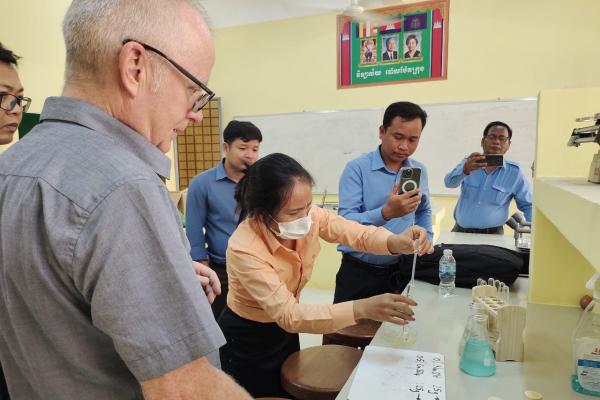
There are 11 schools that I work with in my region. Together with my local colleague, Vat Vey, we are helping science teachers in these schools to deliver practical work to students. This involves showing them how to use new equipment, co-planning and teaching practical lessons, and providing follow-up reflection and coaching. Our focus is on students aged 15-18 (grade 10-12) who are preparing for their pre-university exams.
Vey is a great support, helping me with language and organisation. When we’re not working together, he works on delivering the library development programme and career development counselling.
The schools are scattered about the region; the closest is in town, and others are located one to three hours away. All of them have new or newly renovated purpose-built labs, but the equipment is varied and some everyday resources, such as glassware and chemicals are limited, despite new equipment being supplied.
While some local teachers are very good at creating makeshift resources, others are hesitant to use the equipment, and sometimes you find that it’s still unopened and unused! Additionally, with 40+ students per class, the labs can become quite cramped
The need
The education and experience of teachers is quite varied and only 20% of grade 12 students follow the science route – with the majority pursuing the humanities instead. However, the government would like to develop more science-educated students to help drive the value-added economy in STEM areas. Good STEM investigatory work should lead to greater engagement and understanding and, ultimately, success in exams.
My volunteer experience
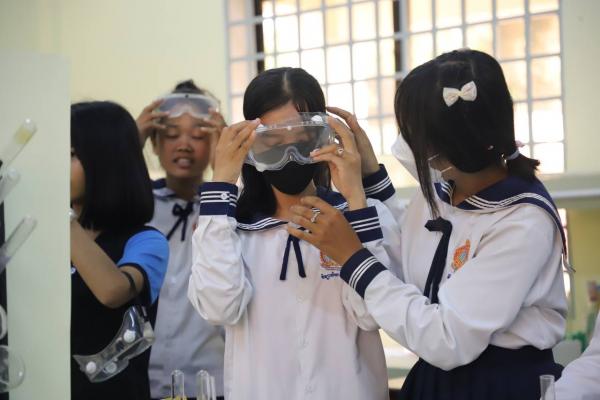
My experience in school leadership means I am well prepared to discuss the development of teaching and learning with leadership teams in Cambodia. I understand the pressures that schools face, and my role as a science advisor means I am used to developing and delivering INSET (in service education and training) outside of my own school. When I was teaching in Malawi, my task was straightforward – to teach – but here I have had to develop a programme and modify it based on the specific needs of each school.
Schools are more hierarchical here than back home, so it is important to work within and respect relationships. Many teachers also have second jobs to supplement their wages, which can limit their availability after school.
As well as the challenges with equipment, space, and teachers education, there is also a lack of science technicians; ICT provision is still in its early stages and maintenance can be an issue. However, the majority of teachers are keen to develop and are grateful for support, and behaviour management is not an issue with students.
It’s also hot here!
Why volunteer?
My personal motto is "Be kind and try your best," (which I credit to Shaun Smith, a pastoral leader at my old school). I am passionate about science and passing that on to others. Volunteering is great because the sharing of expertise and experience works both ways, giving everybody a wider perspective on the world, and allowing us all to develop in new ways.
I enjoyed my previous experience, and retirement gave me the freedom to volunteer again. Helping other teachers is rewarding, but it's also an adventure to immerse myself in a new country and discover its culture.
Why VSO?
I first heard of VSO in the 1990s, when I trained at the Institute of Education in London. On considering them, I was glad to see they had developed a more post-colonial mindset and a greater emphasis on local experts and skills. I like the collaborating with local volunteers and leaders alongside the established network of support and training. VSO has a certain reflective professionalism, and an ethical, inclusive approach.
A day in the life
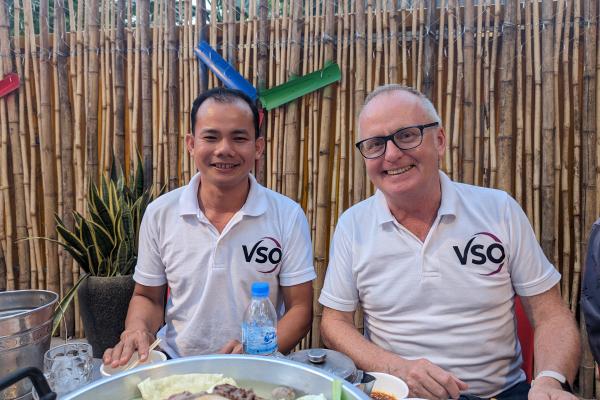
I wake up at 5:30 am to be on the road by 6 am. Vey and I usually stop for breakfast at a local restaurant for a traditional meal of coeey teo (noodle soup) and iced coffee (we save the ice for investigating the effect of temperature on chemical reactions later!).
If it’s our first visit to a school, we meet with the school leadership to outline the project goals, then head straight to the labs to work with teachers on using new equipment and planning a whole-class investigation. I’m now at the stage of conducting return visits, where I co-teach and observe the delivery of practical lessons, followed by a discussion of the positives and negatives of the session to inform future planning.
After a well-deserved lunch with a quick relax in a hammock (you find this in most restaurants!), it’s back to school to work with another science class.
During the drive back home, we reflect on the day's activities and discuss anything I may have missed due to the language barrier. Working with science teachers in the classroom is where I feel I’ve made the biggest impact here. One particular case that sticks out is a chemistry teacher we worked with who saw practical work as an occasional activity. Now he’s developing a myriad of hands-on approaches to learning to use across his lessons – including year groups not covered by the project.
On office days, we use recent experiences to improve our approach and plan future visits. We also keep local education officers informed of our progress. For lunch, I often go to the VSO office to meet with Chettra, a manager from another project.
After work, Vey and I sometimes relax by the river with a drink and some food. Eating out is cheap, so I probably only cook at home two to three times a week and enjoy the wide variety of local restaurants the rest of the time.
At the weekend, you can find me either at the local bar where an eclectic mix of locals and foreigners meet up to put the world to rights, or with my cribbage group at a local hotel. The owner is English, so there’s even the luxury of Sarson’s vinegar on chips!
I live in a modernish apartment. I cycle everywhere locally and it’s just a 10-minute ride to the French colonial old town and a large market and even a Lucky supermarket. There’s certainly a learning curve with the traffic here, where you are a minnow in the ocean of circling fish of motor scooters and lumbering sharks of cars. It’s 3D chess, and the lack of collisions always surprises me.
When I can, I try to see the sights and take in the more rural life outside town. A VSO colleague is looking into the feasibility of eco-tourism and so I have visited some homestays with him and experienced a part of Cambodia others may miss.
The challenges
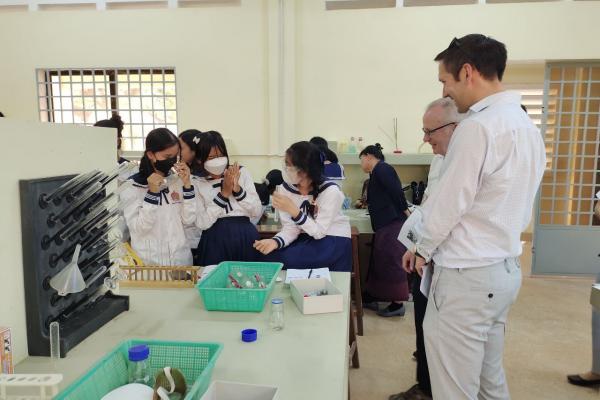
The language barrier can be frustrating as you are often ignored when you attempt it. Battambang is a relatively large town with a wide variety of people living there, so fortunately I can usually find local people who speak English. I do go to Khmer lessons, but I can’t pretend to be fluent!
Professionally speaking, it can be challenging to develop a programme that works both in theory and in practice, even if it doesn’t match up with my prior experience in the UK. Patience is a virtue here, waiting for permissions and agreements to proceed with different stakeholders can take time. Sometimes I need other trainers to bounce ideas off so I have to phone colleagues based elsewhere in the country.
I’ve become more resilient and able to enjoy my own company. The need to adapt quickly to unexpected challenges – like turning up at a school lab where there is no water or electricity – means I have to be more flexible and patient, which is good for me. I also take the time to be more reflective and have a new appreciation for all the luxuries I have in the UK.
My highlights
The things I love most about my job are seeing a new country and culture, sharing my passion for science teaching, and making small changes that will build into an improved experience for students.
People are very friendly and open to engaging with the project. You need to overcome the idea that you are an experts turning up with all the ideas, as local teachers already have plenty of skills and knowledge themselves.
My grey hair means I am a respected elder! The novelty of being a foreigner means I have had my photograph taken every day I work in schools. I know how Brad Pitt feels.
What would you say to someone who is considering volunteering?
Do it. Give yourself time to settle in before you expect to make a difference.
About the project
The Professional Development in Upper Secondary Schools project (PDUSS), is an education project that aims to enhance the inclusiveness, effectiveness, and relevance of upper secondary education in five regions of Cambodia.
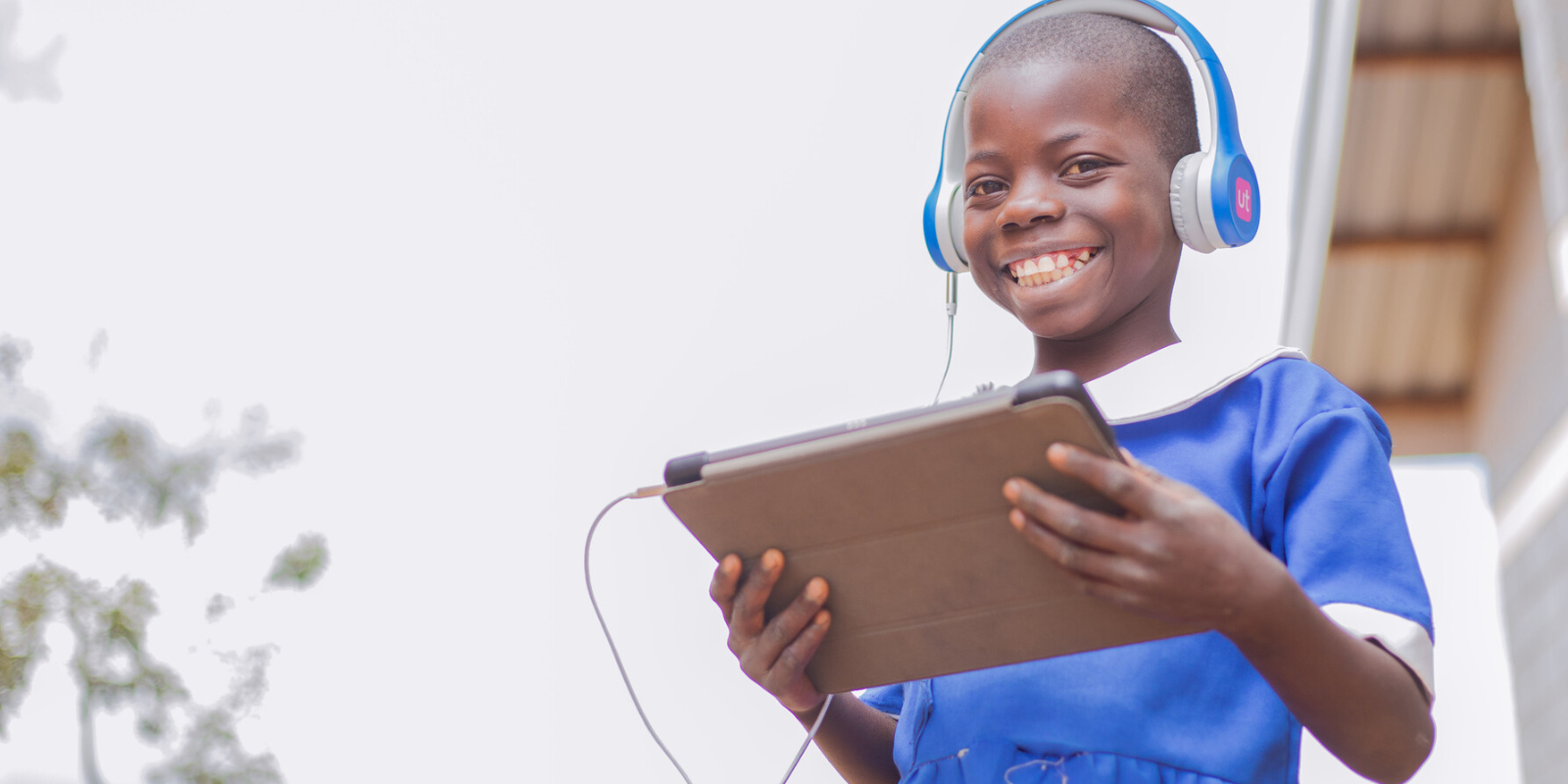
Support us with a donation
Read more
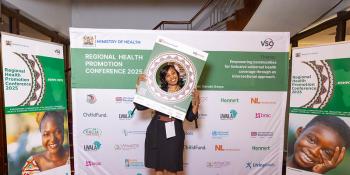
In photos: Our Regional Health Promotion Conference 2025
Check out some of our favourite photos from Regional Health Promotion Conference (RHPC25). This event sought to reimagine Universal Health Coverage through the lens of intersectionality.
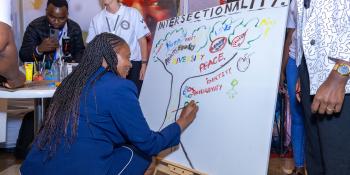
Using intersectionality to create healthy beginnings and hopeful futures
World Health Day brings global attention to the urgent need to end preventable maternal and newborn deaths. Learn more about how our Regional Health Promotion Conference is tackling these issues head on.
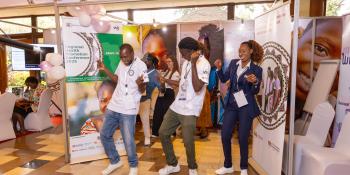
Highlights from the Regional Health Promotion Conference 2025
The Regional Health Promotion Conference 2025 reimagined Universal Health Coverage (UHC) through the lens of intersectionality, by bringing together experts from across East Africa and beyond.
